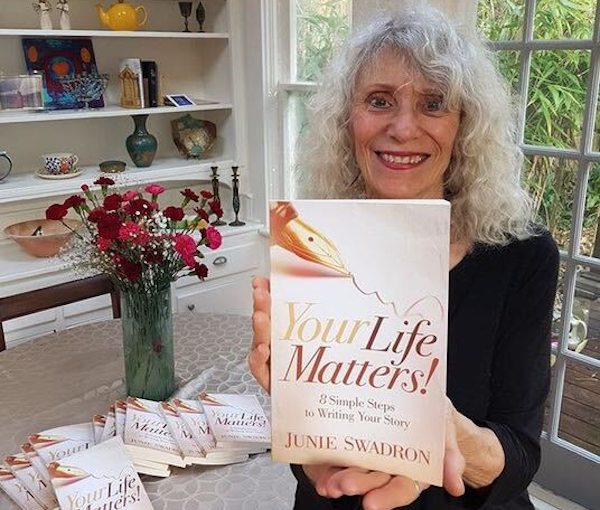Junie Swadron recently released her latest book. (photo from Junie Swadron)
The Nov. 3 release of Junie Swadron’s most recent book, Your Life Matters! 8 Simple Steps to Writing Your Story, could not have arrived on the shelves of booksellers at a more opportune time. The pandemic has presented an occasion for self-reflection, and a chance to place memories and contemplations onto paper and computer.
Swadron, a Victoria-based psychotherapist, author and writing coach, hopes the book will aid prospective memoirists in writing their story, breaking through blocks with confidence and freeing them from what may have been a painful past. Hard lessons of life can become the greatest gift, she says, and writers can inspire others with the wisdom they have gained.
“In my 30 years practising psychotherapy, the most common theme among clients – whether they be CEOs of large companies or art students – is low self-esteem. Most people don’t value what they have achieved and don’t know how to recognize the good in themselves, to varying degrees,” Swadron, who is Jewish, told the Independent.
“This is a book for people to look at their lives and see the value, the beauty and the contributions they have made. And then to write their life stories from an empowered place, from a place of feeling strong, tall and proud. Not in an egoistic way, but in a way that they can say, ‘Hey, look how far I’ve come. Or, wow, I did that!’”
The challenge of writing a memoir can be daunting, the book notes, even for a professional with years of experience in their chosen field or an individual with a unique point of view. In Your Life Matters, Swadron attempts to guide the reader towards a focus on common themes – while remaining honest and truthful to the past – and the recording of meaningful experiences with certainty and ease. She also shares some of the factors that have helped her become a more assured writer and demonstrates how someone could apply these insights to their own memoir.
The book, too, provides therapeutic exercises for writers to use when drafting their stories. A memoir, Swadron said, can be a useful tool for an individual to work through difficult experiences and reframe their trauma. Your Life Matters lists steps to record the significance of life’s major events and influences. According to Swadron, memoir writing then becomes a memorable and achievable goal.
“The book is for anyone who wants to recount their life journey, whether they be a senior or an entrepreneur, and take the time to understand more about themselves throughout the process and transform pain from the past. What sets me apart from other writing coaches is being a psychotherapist. Not only do I know how to teach people how to write books, I get them to dive deep into their story and come out the other side stronger, as a result of them knowing who they are,” she explained.
“Say a person found a weight loss program and it’s really successful,” Swadron posited. “They got into it in the first place because they needed to lose weight. They lost 200 pounds, kept it off, and they need to not only write the story of how they did that but who they were as someone struggling with a food addiction. And who they have become since they have achieved their maximum goal of what is healthy for them. They need to put themselves in the story for others to be able to relate to whatever it is they are passionate about because they have found a solution and can assist others going through a similar struggle to find their way with more ease and grace.”
She cites her operating principle as “your soul meets you on the page and something shifts. You begin to stand taller. Then, one day, you notice your voice on the page has become your voice in the world.”
Swadron has three previous titles to her credit: Colouring Your Dreams Come True, a colouring book for people of all ages, Re-Write Your Life and Write Where You Are. Additionally, she has penned a piece for the stage, Madness, Masks and Miracles, a play to dispel myths and stigmas about mental illness. Last year, she founded the Academy for Creative and Healing Arts (ACHA) for people with mental health challenges.
Beyond her books, Swadron provides workshops, online courses and meetings throughout the year – all of which are currently taking place on Zoom – to help people with their writing. These include an author mentorship program, a class on creativity during COVID-19 and a Sunday morning “sacred” writing circle. For more information, visit her website, junieswadron.com.
Sam Margolis has written for the Globe and Mail, the National Post, UPI and MSNBC.

